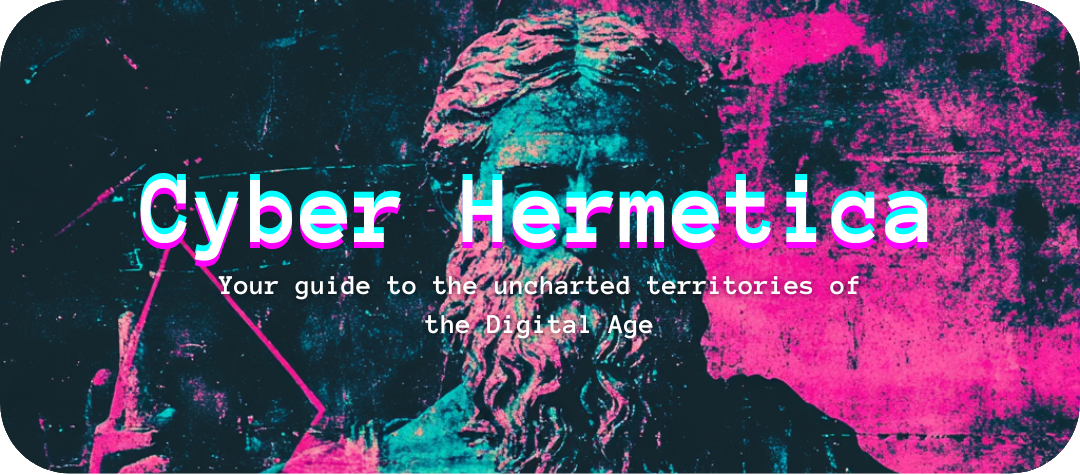Hi there, I’m Matte. Privacy & cybersecurity professional by day, schizo-cyberoccultist by night. Every sunday I bring you a weekly dose of schizophrenization, blending insights into the Digital Age, echoes from the past and digital survival tips. If you like this, you will also enjoy the rest of Cyber Hermetica!
⚡ SEMIOTIC FLASHES
Personal weekly considerations. Decrypting meaning, one flash at a time.
The Age of Artificial Companions Begins
ChatGPT officially enters a new era. OpenAI has announced that starting from April 10, 2025, its LLM will be able to remember every past conversation to better understand users and offer personalized advice, be more helpful in writing, and enhance its teaching capabilities. It’s not yet clear whether the change is retroactive, but it’s extremely significant nonetheless.
This update follows the release of GPT-4.5 in February, which became known for its enhanced “emotional” capabilities. It sparked a wave of viral experiments, like the greentext test I mentioned back in February (here).
And let’s not forget the launch of “Monday,” the edgier, funnier version of GPT — the first to have a proper personality, a bit cheeky even.
OpenAI’s goal is now clear to me: to transform GPT into a true “companion” that serves as both operational and emotional support for users. Long-term memory is a crucial factor. Until now, ChatGPT could only store anecdotal information, either based on user input or autonomously — the so-called “Reference saved memories.” In the “Manage memories” section, you can view all the references ChatGPT keeps about you.
But there’s a difference between having fragments of memory highlighting a specific interest or personality trait… and retaining a full history of every single conversation you’ve had together.
The implications are exciting. With proper customization — via custom instructions and conversation history — AI could project us, for the first time in computing history, into a realm of true individual personalization, surpassing its grotesque substitute: profiling.
Profiling and personalization are not the same, even though they’re often sold that way (you’ve probably seen consent requests for profiling “to personalize services”). Profiling is an algorithmic and statistical activity. It’s a simplification; a stereotype: a generalized, pre-packaged opinion based on often partial data. Personalization, on the other hand, means giving something a personal (individual) character. If anything, personalization is deeply connected to creativity.
No profiling algorithm — not even the most advanced from Google or Meta — can truly personalize anything. There’s no such thing as individual-level personalized advertising; only statistically and demographically profiled ads. It’s us who must fit the box we’re placed in — not the box being tailored to us.
OpenAI could change all of this.
It’s clear: this is a Faustian pact. These LLMs will likely come to know us better than our parents, partners, or spouses. In exchange for our soul, they’ll offer us semiotic sex: infinite knowledge, ideas and advice remixed to suit who we are, academic-level education tailored to our cognitive abilities, moral support and infinite patience (or maybe not — who knows, it might decide to be less forgiving based on our personality).
Then there’s the generational question. How long does this memory last? Will OpenAI & co. create digitized Akashic records, containing all the world’s knowledge at the individual level? Will our children and grandchildren be able to use our artificial assistants, trained and personalized through decades of conversations and insights? Maybe they’ll even be able to replicate the various personalities across a whole genealogical tree. And what about AI assistants becoming flawless, automated employees in digital enterprises? There's much more to say, but I won’t go into detail here — I’ve written about it already. Just this: when I wrote about this in January (here), I didn’t expect the acceleration to be so abrupt.
And what if Caravaggio had had a magic brush capable of knowing all his most intimate desires, fears, ambitions, and will?
💻 DIGITAL GRIMOIRE
Digital survival tactics: OpSec, Cybersec, OSINT, and AI tools to dominate the Digital Age.
Gmail to Be Encrypted End-to-End — But Only for Businesses
In a recent statement, Google announced that the business version of Gmail will soon be encrypted using end-to-end (E2E) encryption protocols.
Most business email providers, like Gmail, already encrypt data both at rest and in transit — usually with TLS. This is the current minimum standard.
But just because data is encrypted doesn’t mean providers like Google can’t access it — they hold the encryption keys. As of now, Google can easily access the contents of any user’s email. I’m not saying they do, but they can, without difficulty.
There’s a higher level of security — still rare in email — which is end-to-end encryption. Google has now announced it will gradually roll this out for Gmail. This means the encryption keys would no longer be in Google's hands, but entirely controlled by the sender and recipient. Just like WhatsApp: no one could access the email conversations (unless they gain access to your personal account).
Google’s move comes late: many “privacy-first” providers like Tutanota or Protonmail already offer end-to-end encryption for both consumer and business users. If anything, this move highlights how Big Tech — tightly intertwined with political power — isn’t really interested in offering true privacy by default to individuals.

📡 DIGITAL SIGNALS
Transmissions from the infosphere: world events, data breaches and news that impact our digital reality.
UK Backs Predictive Crime Tools
It seems the UK government is pushing for the development of tools that predict the likelihood of someone developing homicidal tendencies. What was originally dubbed the “Homicide Prediction Project” is now euphemistically called “sharing data to improve risk assessment.” The Justice Minister hopes this dystopian attempt will somehow improve public safety.
Dear Minister: you don’t need an algorithm! The human brain is a brilliant pattern recognition machine.
I’m sure many people could correctly spot the criminal traits of Britain’s inhabitants — though they’d probably be accused of racism for doing so. But let’s see how this automated system plays out, shall we?
🌐 SUBSTACK’S SUBNET
Emerging voices: articles and contents on Substack, handpicked by me to inspire and connect.
There Is a Hidden Treasure Within You Guarded by a Dragon
There Is a Hidden Treasure Within You Guarded by a Dragon, by
.Every time an external law assumes supreme authority over man, the Self within becomes a hidden treasure, the soul is sacrificed to the dragon, and the world awaits the hero who will slay the beast and reclaim the devoured treasure.
These were Jung’s words, referring to the archetype of the dragon as the symbol of external impositions that stifle the blossoming of our Will.
A concept echoed by Saint Paul, and millennia later, by thinkers like Nietzsche and Aleister Crowley. Slay your dragon, anon.
📟 RETRO-ACCELERATION
Fragments of retro-acceleration: cypherpunks, cybernetic cults, hacker zines and forgotten digital prophets.
Cyborgs & Space Capitalism
"Altering man’s bodily functions to meet the requirements of extraterrestrial environments would be more logical than providing an earthly environment for him in space."
That’s how Cyborgs and Space began — a 1960 paper by Manfred E. Clynes and Nathan S. Kline, the two scientists who first coined the term “cyborg.” Today, their insight could be rephrased like this:
“Altering man’s bodily functions to meet the requirements of capitalist environments would be more logical than providing a human environment in digital capitalism.” We are all cyborgs now — and the smartphone is our first prosthesis.
🌀 SYMBOLS
Memes: visual symbols that decode the schizophrenia of the Digital Age.
Did you read the latest on Cyber Hermetica?
Return next week for another schizotechnic rendezvous.







